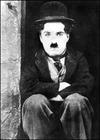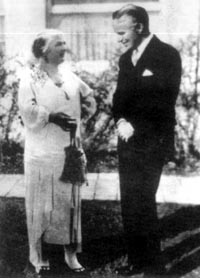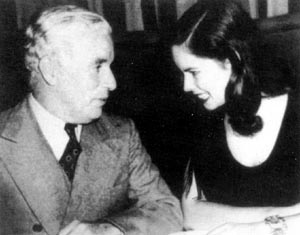 “即使美国政府诋毁他,他还拥有他的家庭,以及全世界的赞誉。”——卓别林早年父母离异,身为滑稽演员的母亲绞尽脑汁,让他们兄弟俩在温馨而快乐的环境中长大。而无果而终的青涩初恋、连续三次失败的婚姻都驱使喜剧大师全身心地投入工作,直至与第四任妻子、著名剧作家的女儿定居瑞士、生儿育女、走入幸福的后半生……
“即使美国政府诋毁他,他还拥有他的家庭,以及全世界的赞誉。”——卓别林早年父母离异,身为滑稽演员的母亲绞尽脑汁,让他们兄弟俩在温馨而快乐的环境中长大。而无果而终的青涩初恋、连续三次失败的婚姻都驱使喜剧大师全身心地投入工作,直至与第四任妻子、著名剧作家的女儿定居瑞士、生儿育女、走入幸福的后半生……
His mother Hannah was an entertainer, a wonderful mimic1; she had a sweet, charming voice. His father was also an entertainer and although not one of the big names, he was doing very well. While they were by no means rich, the music hall provided the Chaplin with a comfortable living. Unfortunately happy life didn't last long. Father's alcoholism was slowly, but surely destroying his marriage. Finally it ended in divorce.
But Hannah was indomitable. Without her, Charlie Chaplin would have become just one more child lost in the poverty of Victorian London. Somehow she not only managed to keep Charlie and his brother Syney clean and warm, clothed and fed but she conjured2 little treats for them. She would sit at the window watching the passersby3 and guess at their characters from the way they looked and  behaved, spinning tales to delight Charlie and Syney. Charlie took in her skills and went on using them all his life.
behaved, spinning tales to delight Charlie and Syney. Charlie took in her skills and went on using them all his life.
1908, Charlie was nineteen and he fell in love. Hetty Kelly was only fifteen. But her parents quashed the romance before it really begun-- but the memory of pretty Hetty stayed with Charlie all his life.
In 1914, World War I had broken out. Chaplin contributed to the war in the best way he knew how-- he made a film "Shoulder Arms". He made a comedy set in the trenches4. The returning troops enjoyed it. Being able to laugh at the insanity5 of war had been their only real defence. Two days after its release, Charlie married Mildred Harris, pretty in the same way as his first love Hetty Kelly. It was hopeless even from the very start. He had only one way to face such sorrow. He threw himself into work on a new feature-- length film called The Kid. The kid tackled another social concern that deeply upset Charlie Chaplin-- the treatment of abandoned children. The Kid was a success. But Charlie's private world continued to fall apart. In November, 1920, they were officially divorced.
In November 1924, Charlie had married his leading lady, Lita Grey. It was no wiser a marriage than his first had been. Despite the turmoil6 in his private life, Charlie went on and made a film called The Circus.
After failure of the third marriage in 1942, He had met a young woman, the daughter of the great American playwright7, Eugene O'Neill. She was only 17 years old and she and Charlie had fallen deeply in love. Her name was Oona.
And now it was 1945, after the world II, America had become affected8 by a kind of madness, an  obsessive9 fear and hatred10 of Communism. Charlie become the victim of this persecution11. Against this atmosphere of persecution he set to work on a new film. The film was Limelight, the story of an aging music hall performer and the young girl he helps to success. Into it he put his memories of the London and the theatrical12 life he had known as a boy. America's anti-communist emotions had found a new and more lunatic voice. On his way to London for its premiere. The US Attorney General had forbidden Chaplin re-entry to the United States. He was an exile.
obsessive9 fear and hatred10 of Communism. Charlie become the victim of this persecution11. Against this atmosphere of persecution he set to work on a new film. The film was Limelight, the story of an aging music hall performer and the young girl he helps to success. Into it he put his memories of the London and the theatrical12 life he had known as a boy. America's anti-communist emotions had found a new and more lunatic voice. On his way to London for its premiere. The US Attorney General had forbidden Chaplin re-entry to the United States. He was an exile.
He was received warmly in London and hailed as a genius. In the US, the vicious attacks continued, Charlie couldn't go back, and the family left for Switzerland. In January 1953, they settled in the beautiful house at Corsier-sur-Vevey that was to be Charlie's home for the rest of his life.
If America had denounced Charlie, he had his family-- and the acclaim13 of the rest of the world.
mimic n. 模仿者,小丑 alcoholism n. 酗酒
Indomitable a. 不屈不挠的,顽强的 conjure v. (以咒文)召唤,施魔法
treat n. 宴请,款待 take in 注意到,吸收,理解
quash v. 取消,制止 insanity n. 癫狂,神经错乱
turmoil n. 混乱 trench n. 战壕
playwright n. 剧作家 vicious a. 恶意的,刻毒的
persecution n. 迫害 premiere v. 初次公演
lunatic a. 疯狂的,极端愚蠢的 exile n. 被放逐者
acclaim n. 喝彩,欢呼,称赞 denounce v. 公开指责、抨击
 收听单词发音
收听单词发音 
 “即使美国政府诋毁他,他还拥有他的家庭,以及全世界的赞誉。”——卓别林早年父母离异,身为滑稽演员的母亲绞尽脑汁,让他们兄弟俩在温馨而快乐的环境中长大。而无果而终的青涩初恋、连续三次失败的婚姻都驱使喜剧大师全身心地投入工作,直至与第四任妻子、著名剧作家的女儿定居瑞士、生儿育女、走入幸福的后半生……
“即使美国政府诋毁他,他还拥有他的家庭,以及全世界的赞誉。”——卓别林早年父母离异,身为滑稽演员的母亲绞尽脑汁,让他们兄弟俩在温馨而快乐的环境中长大。而无果而终的青涩初恋、连续三次失败的婚姻都驱使喜剧大师全身心地投入工作,直至与第四任妻子、著名剧作家的女儿定居瑞士、生儿育女、走入幸福的后半生…… behaved, spinning tales to delight Charlie and Syney. Charlie took in her skills and went on using them all his life.
behaved, spinning tales to delight Charlie and Syney. Charlie took in her skills and went on using them all his life. 


